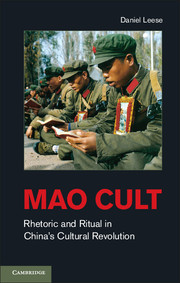Book contents
- Frontmatter
- Contents
- Illustrations, Figures, Maps, and Table
- Preface
- Chronology of Major Events
- Abbreviations
- Map Administrative divisions of China
- Introduction
- Part One Coming to Terms with the “Cult of the Individual”
- Part Two Charismatic Mobilization
- Part Three Cult and Compliance
- Conclusion
- Bibliography
- Glossary
- Index
Conclusion
Published online by Cambridge University Press: 07 October 2011
- Frontmatter
- Contents
- Illustrations, Figures, Maps, and Table
- Preface
- Chronology of Major Events
- Abbreviations
- Map Administrative divisions of China
- Introduction
- Part One Coming to Terms with the “Cult of the Individual”
- Part Two Charismatic Mobilization
- Part Three Cult and Compliance
- Conclusion
- Bibliography
- Glossary
- Index
Summary
It is a remarkable characteristic of modern personality cults that they are declared to be alien to the fundamental laws and principles of every political system by their own representatives. Democratic politicians tend to relegate the phenomenon to totalitarian or at least authoritarian forms of government. Many dictators on the other hand claim the popular nature of their respective cults. Saparmurat Niyasov, better known as Turkmenbashi, who cultivated one of the most excessive leader cults in recent years, once said: “I’m personally against seeing my pictures and statues in the streets – but it’s what the people want.” Most communist leaders invoked feudal relics in the superstructure to explain the appearance of personality cults in their own party-states, which were purportedly built on a scientific and rational worldview. Even the architects of the massive leader cults in Nazi Germany or Benito Mussolini’s fascist dictatorship in Italy tried to quell the impression of having deliberately relied on the emotional appeal of personalized politics and symbols. Instead, they tried to emphasize the scientific nature of their ideologies. Adolf Hitler thus in a talk with two leading apologists of his personality cult, Alfred Rosenberg and Heinrich Himmler, explicitly warned against transforming national socialism, which he described as “a cool and highly-reasoned approach to reality based on the greatest of scientific knowledge,” into a mystic cult movement.
- Type
- Chapter
- Information
- Mao CultRhetoric and Ritual in China's Cultural Revolution, pp. 253 - 264Publisher: Cambridge University PressPrint publication year: 2011



